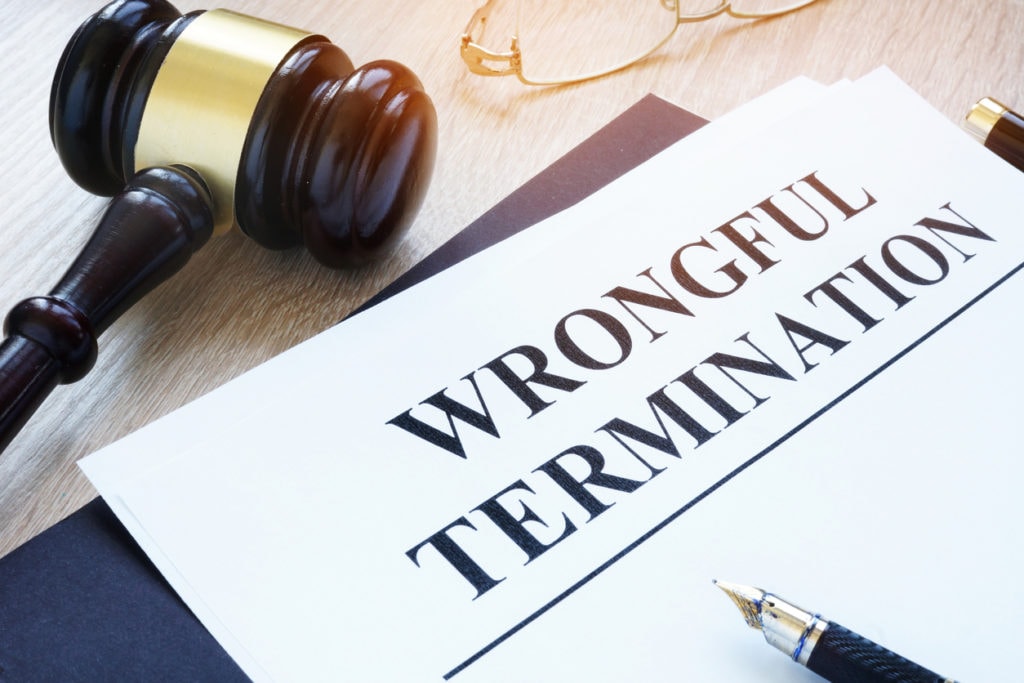Have you ever felt that you were wrongfully terminated from your job in Colorado? If so, you’re not alone. Many employees have faced similar situations and have sought justice for their unfair dismissal. But how can you determine if your termination was indeed wrongful, and what rights do you have under Colorado law? This blog post will provide insights into wrongful termination in Colorado, the types of claims that can be filed, and how experienced contingency lawyers for wrongful termination can help you navigate this complex process. So buckle up and get ready to uncover your rights under wrongful termination Colorado laws.

Short Summary
Understanding wrongful termination cases in Colorado involves knowing the exceptions to at-will employment and different types of claims available.
Filing a claim requires submitting documents, adhering to deadlines/statutes of limitation, and understanding potential outcomes.
Consulting with an experienced employment law attorney can help ensure your rights are protected and maximize compensation for any successful claim that might arise from wrongful termination cases.
Understanding Wrongful Termination in Colorado
In Colorado, wrongful termination is defined as terminating an employee in a manner that violates public policy – for instance, firing someone for exercising a legal right, refusing to commit a criminal act, reporting illegal workplace conduct, or engaging in lawful off-duty activities. Although Colorado is an at-will employment state, meaning employees can be terminated for any reason or no reason at all, there are exceptions that protect workers from wrongful termination.
Let’s delve into the intricate world of at-will employment and its exceptions to help you better understand your rights under Colorado law.
At Will Employment Colorado
In Colorado, the at-will employment rule means that either the employer or the at-will employee can terminate the employment relationship without cause or notice. However, this rule has its limitations. For instance, it doesn’t apply if the termination violates public policy, such as firing an employee for reporting illegal activity or refusing to perform an illegal act, or engaging in protected activity such as filing a workers’ compensation claim or OSHA complaint. So, while at-will employment offers employers considerable leeway in their personnel decisions, it doesn’t grant them carte blanche to dismiss employees for unlawful reasons.
Aside from public policy exceptions, federal law also provides protections against wrongful discharge based on factors such as race, national origin, sex, disability, religion, and military status or service. These protections ensure that employees are not subjected to unlawful termination, even in an at-will employment state like Colorado.
Now that we’ve covered the basics of at-will employment, let’s explore the exceptions to this rule in more detail.
Exceptions to At Will Employment in Colorado
The first exception to at-will employment is discrimination. Under both federal and Colorado law, employees are protected from termination based on their race, color, ancestry, national origin, sex, pregnancy, religion, disability, age, sexual orientation, and transgender status. For example, if an employee is fired solely because of their gender or because they disclosed a pregnancy, it could be considered a discrimination-based wrongful termination.
Another exception is retaliation, which occurs when an employee is terminated for participating in protected activities, such as reporting illegal conduct or exercising their rights under employment laws.
Lastly, breach of contract claims arise when termination violates the terms of an express or implied employment contract. In such cases, the employee could argue that their dismissal was a breach of contract and seek legal remedies. With these exceptions in mind, let’s take a closer look at the different types of wrongful termination claims in Colorado.
Types of Wrongful Termination Claims in Colorado

Whether you were terminated due to discrimination, retaliation, or breach of contract, it’s crucial to understand the types of wrongful termination claims available in Colorado. Each type of claim has its unique requirements and challenges, and knowing which one applies to your situation can help ensure that you build a strong case.
In the following sections, we’ll explore each type of claim in greater detail, providing crucial insights to help you determine the best course of action.
Discrimination-Based Claims
Discrimination-based claims arise when an employee is terminated due to their protected characteristics, such as race, gender, or age. These claims often involve demonstrating that the employer’s reason for termination was a pretext for discriminatory motives. For instance, if an employee was fired shortly after disclosing a pregnancy despite having received satisfactory reviews and no prior warnings, this could be an example of a discrimination-based wrongful termination.
Employees who successfully prove discrimination-based wrongful termination may be eligible to file a claim, potentially resulting in compensatory and punitive damages.
Retaliation-Based Claims
Retaliation-based claims involve termination due to an employee’s participation in protected activities, such as reporting illegal conduct or exercising their rights under employment laws. For example, if an employee is fired for blowing the whistle on illegal practices in the workplace, or for filing a workers’ compensation claim for a work-related incident, this could be considered a retaliation which could lead to a wrongful termination claim.
In order to successfully prove a retaliation-based claim, the employee must demonstrate that their termination was a direct result of their engagement in a legally protected act. Employees who establish a claim of retaliatory wrongful termination may be eligible for compensatory and punitive damages.
Breach of Contract Claims
Breach of contract claims occur when an employer terminates an employee in violation of the terms of an express or implied employment contract. For example, if an employee’s contract guarantees job security for a specified period, and the employer fires them without a valid reason before that period ends, the employee may have a legal claim for breach of contract.
It’s important to note that an implied contract, such as those established through employee handbooks or verbal agreements, can also form the basis for a breach of contract claim.
Filing a Wrongful Termination Claim in Colorado
Once you’ve identified the type of wrongful termination claim that applies to your situation, the next step is to file your claim. In Colorado, if your claim is based upon discrimination, harassment, or retaliation based upon a protected category, this process will generally involve submitting a claim to the Equal Employment Opportunity Commission (EEOC) or the Colorado Civil Rights Division.
But filing a claim is just the beginning of the journey. To maximize your chances of success, you’ll need to gather documentation and evidence, adhere to deadlines and statute of limitations, and understand the potential outcomes of your claim.
Let’s delve into these crucial aspects of filing a wrongful termination claim in Colorado.
Documentation and Evidence
The success of your wrongful termination claim largely hinges on the strength of your documentation and evidence. To support your claim, you’ll need to gather crucial materials such as emails, performance evaluations, and witness statements. These documents can help paint a comprehensive picture of the events leading up to your termination and demonstrate that your dismissal was unjust.
Additionally, keeping a detailed record of your employment history, including any incidents of discrimination or retaliation, can prove invaluable in building a strong case for wrongful termination.
What is the Wrongful Termination Statute of Limitations in Colorado?
When it comes to filing a wrongful termination claim in Colorado, time is of the essence and you should not delay. As time passes, the critical evidence to support your claim can be lost, and witnesses can move away or their memories can fade. Acting quickly is the best way to make sure your claim can be presented in the best way possible.
The statute of limitations, or the deadline by which you must file a lawsuit against your employer, as well as other deadlines for filing wrongful termination claims vary depending on the type of claim and the applicable laws.
If your claim is based upon discrimination, harassment, or retaliation based upon a protected category such as gender, religion, disability, national origin, race, age, or sexual orientation, the deadline for filing a claim with the EEOC is 180 days, but because Colorado law also prohibits discrimination, the deadline is generally extended to 300 days. If you (or your legal counsel) do not timely file a complaint with the EEOC or the Colorado Civil Rights Division, you will lose your right to pursue your claim.
If your claim is based upon other kinds of retaliation, such as refusing to engage in unlawful activity requested by your employer (like falsifying time records), filing a workers’ compensation claim, or reporting unethical conduct to your boss, then the statute of limitations to file a lawsuit in Colorado is generally two years from the date of your wrongful termination.
For wrongful termination claims based upon breach of contract, or breach of implied contract, Colorado has a three-year statute of limitations.
As you can see, it is critical to know what type of claim you have, as missing any deadlines can result in losing your right to pursue your claim. It’s crucial to act promptly and consult with experienced employment attorneys to ensure that you understand the applicable statute of limitations for your type of claim, and that your claim is filed on time. Do not miss any wrongful termination deadlines as this may eliminate your ability to pursue your case.
Potential Outcomes
The potential outcomes of a wrongful termination claim in Colorado can vary widely, ranging from settlements to court judgments to reinstatement of employment. Financial compensation for lost wages and damages, reinstatement to a previous or comparable position, and punitive damages in certain cases are all possible outcomes of a successful claim.
However, it’s important to remember that each case is unique, and outcomes can be influenced by factors such as the strength of your claim, the quality of your evidence, and the skill of your legal representation.
How Colorado Employment Law Attorneys Can Help

Navigating the complex world of wrongful termination in Colorado can be daunting, but you don’t have to face it alone. A Colorado employment lawyer can provide valuable assistance throughout the claims process, ensuring that your rights are protected and that you have the best chance of achieving a favorable outcome.
In the following sections, we’ll explore the specific ways in which Colorado employment law attorneys can help you with your wrongful termination claim.
Evaluating Your Case
One of the most critical services that employment law attorneys provide is evaluating your case to determine the strength of your wrongful termination claim and the best course of action. This assessment can help you decide whether pursuing a claim is worthwhile and can save you time, effort, and resources in the long run.
In addition, an experienced attorney can identify potential pitfalls in your case and recommend strategies to overcome them, increasing your chances of success.
Representing Your Interests
Employment law attorneys can also represent your interests during negotiations, mediation, or litigation, ensuring that your rights are protected and that your voice is heard. This representation can be particularly valuable if your case goes to court, where the stakes are high, and the outcome can have lasting consequences for your career and financial well-being.
With a skilled attorney by your side, you can feel confident that your interests will be safeguarded throughout the legal process, including during trial.
Maximizing Compensation
Finally, an experienced employment law attorney can help you maximize your compensation by pursuing all available remedies, such as back pay, front pay, emotional distress damages, punitive damages, and attorney fees and costs. By exploring every possible avenue of compensation, your attorney can ensure that you receive the financial support you need to move forward after a wrongful termination.
Additionally, by seeking punitive damages where appropriate, you and your attorney can send a strong message to employers that discriminatory and retaliatory practices will not be tolerated in Colorado.
A wrongful termination lawsuit is the backstop for achieving that justice.
Summary
In summary, wrongful termination in Colorado is a complex and multifaceted issue that can have lasting consequences for both employees and employers. By understanding your rights under Colorado law, knowing the types of wrongful termination claims, and seeking the assistance of experienced employment law attorneys, you can navigate this challenging process and protect your interests. Remember, you don’t have to face wrongful termination alone – with the right knowledge and support, you can stand up for your rights and achieve justice. Please also check out our 4 instances where you can sue your employer in Colorado blog. To consult with our continency lawyers for wrongful termination simply contact us below.
Frequently Asked Questions
What is considered wrongful termination in Colorado?
In Colorado, wrongful termination can occur when an employee is fired based on their protected class, such as race, gender, or disability. Termination decisions based on any of these categories are prohibited by both federal and state law. Termination for protected activity, such as whistleblowing or filing a worker’s compensation claim, can also form the basis of a wrongful termination claim in Colorado, as can a breach of contract.
How do I prove wrongful termination in Colorado?
To prove wrongful termination in Colorado, an employee must show that the employer violated an express or implied contract, or that the discharge was wrongful because it violates public policy (for example, the employer directed the employee to perform an illegal act as part of their job duties and that they were discharged for refusing to do so). In order to support a claim of wrongful or unlawful discharge based upon public policy, the termination of employment must violate a clear public policy and that the employee’s termination was contrary to that policy.
The employee must be able to prove that the employer was aware of the public policy and that the employee’s refusal to comply (or their engaging in the protected activity) was the reason for their termination. This can be done by providing evidence of the employer’s knowledge of the policy, as well as evidence of the employee’s knowledge of the policy.
Can I sue my employer for firing me in Colorado?
You may have a legal claim against your employer for wrongful termination if your Colorado employer fires you for discriminatory reasons, in violation of an employment contract, or in retaliation for exercising your rights.
Discriminatory reasons include race, color, national origin, sex, age, disability, religion, sexual orientation, pregnancy, or any other protected class. An employment contract may include an agreement to provide a certain amount of notice before termination, or to provide severance pay.
What are the rules for terminating an employee in Colorado?
In Colorado, employees can be terminated at any time and for any reason, according to the employment-at-will doctrine. Conversely, employees may also terminate their employment at any time without notice.
What are the Colorado Termination Requirements?
With at will employment as in most states – the bar is very low for any “Colorado termination requirements”. You can terminate for any reason, or no reason at all – however, We always suggest consulting an HR professional or attorney to navigate any concerns and to keep the termination legal and free of any encumbrances from contract violations, protected classes, EEOC and other claims of discrimination, harassment, or wrongful termination. The laws get very fuzzy on timing, intentions, communications, retaliations etc.
What are the exceptions to at-will employment in Colorado?
In Colorado, exceptions to at-will employment include laws that protect against discrimination, retaliation and breach of contract.
Do you feel you were wrongfully terminated?
While there are various exceptions to the at-will employment laws in the state of Colorado, we can help you determine if there are fact patterns which might meet the definitions of discrimination, retaliation or various breaches of contract.
Call 303-331-6186
CONTACT US





